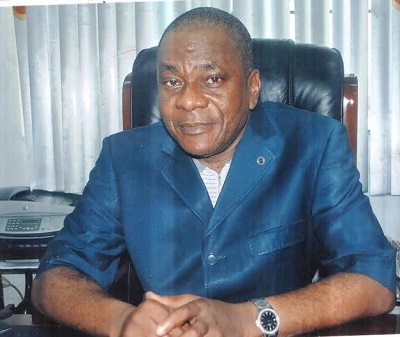Why Manual Truck Call-Up System Failed At Lagos Ports
By Kenneth Jukpor
Alhaji Inuwa Mohammed is the Chairman, Dry Cargo Section of the Nigerian Association of Road Transport Owners (NARTO). In this interview with MMS Plus he reveals the plight of truckers, appraising the manual truck call-up system and the massive corruption it birthed. Alhaji Inuwa also proffers solutions to eliminating the perennial traffic gridlock at Lagos ports. Enjoy it:
Trucking business has become associated with many challenges especially for those operating at Lagos ports. How would you describe the current state of the business considering the bad roads and unending traffic gridlock?
The roads remain heavily dilapidated although we can take solace in the fact that the contractor for the Mile 2 – Tin Can axis has decided to start work. However, the rainy season is posing new threats as the bad portions which are usually avoided by truck drivers are now difficult to identify. This is because these spots have been covered with water and trucks get into such potholes and the consequence is that they fall down causing more traffic bottlenecks and leading to colossal losses if the container had carried goods that could easily damage. Last week, not less than five trucks fell at the Capital oil bus stop along the Tin Can – Mile 2 road.
How has the manual truck call-up system fared and what about the issue of extortion?
Trucking business has reached the lowest ebb by way of investment for truck owners in the country. We are just suffering and smiling. Only a trucker can understand the volume of challenges and crisis that we are going through. Apart from the extortion which is still on, there are several other problems that exist.
These truckers are not only extorted, they are also molested. This situation has led to their strange behavioural patterns on the roads. These are individuals who are unable to take proper baths for days or weeks as they are trapped in long queues, they hardly sleep, there is no proper food yet they are beaten up by security operatives.
The manual truck call-up system is a good initiative but it has been hijacked and distorted. The Nigerian Ports Authority (NPA) came up with this idea and truckers accepted it. The system reduced the traffic gridlock at Apapa but relief lasted for barely three weeks before it failed. When NPA came up with the system we accepted it because we understand that transportation is about turn-over. All trucking groups accepted the system and put in efforts to make it succeed because it was going to guarantee a better business environment for all players in the trucking business and better maritime transport environment. The trucking associations urged all members to take their trucks to their garages or use certain garages approved by the NPA where they could get call-up to access the ports. We admonished some of NARTO members coming from the far North or other parts of the country to use the private parks in Ogere or utilize the parks of other members in Lagos.
Initially the call-up system was successful because the truckers identified the truck parks or garages where call-up could be generated. We came up with thirty-three that we identified ourselves. We had a tight schedule to deliver the names of the designated parks but we did it painstakingly and informed our members of these parks so they could go there to get call-up. The exercise was very successful for the first three weeks and the roads were free.
However, when we decided to go further to identify more parks to make the system function better we got to know that the Authority (implies Nigerian Navy) had already registered almost two hundred parks. The problem is that almost 80% of the new parks registered were ghost parks. Some influential people who are close to the Authority (implies Nigerian Navy) were registered as designated parks for call-up. These people go to the control room at the ports so people can get truck call-ups from them at the rate of N20,000 to N30,000. It became very difficult for the original parks to even get the call-up. That was how they scuttled the manual truck call-up arrangement.
For instance, there is a designated truck park to obtain call-up at Warehouse road in Apapa, we know it is fake because there is no truck park there. Another one uses an address in Osborne in Ikoyi, it is also fake. Those truckers who complied to the process initially have been forced to come out and utilize the corrupt procedure. Those who followed the directive earlier were forced to come out from the truck parks as everyone started going to the port to buy call-ups.
I’m aware that extortion points are over thirty around the port environs. How have truckers been able to navigate through this burden?
I always say that I prefer the journalists to do the findings on this because we keep complaining about this problem and we are beginning to sound like a broken record. I would suggest that you take out time to visit these checkpoints yourself to observe firsthand how the extortion happens. Don’t stop at hearing these complaints from us. As the watchdog of the society, let me kindly implore you to take time to study those areas that have been mentioned. This would enable you come up with a good report and ensure that you are in a better position to explain our difficulties to the society. I wouldn’t be shocked if you are able to discover even more than the issues I can tell you here.
The first quarter of 2019 has ended. As a truck owner in the port sector, what are the key issues you want addressed in the industry?
As a truck owner, the main issue is the traffic gridlock. Although, the government can say it is doing its best with the ongoing rehabilitation of the roads, we find that some people who benefit from the gridlock have become untouchable. However, I’m optimistic that the government wouldn’t leave any stone unturned in this bid to get the traffic situation addressed.
I urge the government to pay keen attention to the maritime industry. Recently, I participated in a seminar on the traffic gridlock at the ports and I learnt from one of the experts that the country loses $803million per day because of the traffic gridlock. It also takes 448hours for a truck to complete one transaction. This is because some categories of people are benefitting from the traffic gridlock.
The contractor responsible for the Mile 2- Tin Can Island Port road has started work but the issue now is pace of the work is too slow. We got to know that the road was divided into four sections to fix the Apap link road through Mile 2, up to Oworonshoki. The contractor has said the construction would take up to 24 months to be completed. We have seen the diagram but we would also need the contractor to show us certain lanes and links to truck parks.
You recently acquired a truck park which is a good development to curb some of the challenges leading to the traffic gridlock at Lagos ports. Tell us about it?
Yes, I got a garage along the Mile 2 – Tin Can route. It’s called GeeGee garage. There are two parts but they are close to each other. One can take about sixty trucks while the other one is slighter bigger as it can accommodate seventy trucks. I invested in this as part of efforts to proffer solution to the Apapa traffic gridlock.
At NARTO, we urged our members to invest in truck garages. Some of our members have truck garages and we have asked them to accommodate other transit members to enable everyone have easy access to the ports. You can’t expect a driver to be happy when he has been on the queue for three weeks without proper rest, sleep, bath or good food. You see them behave like mad people because of the hardship they have been subjected to. The problem started with shipping companies refusing to provide holding bays for their empty containers.
Over 80% of the trucks on the port access roads are there to return empty containers to the ports. When there are garages, they could take their bath, sleep and eat good food before they access the ports with their call-ups. I also urge other truckers to invest in truck parks as part of efforts to address the problem, even though it wasn’t caused by us.
One last word.
I advise the authorities to go for inspection of the truck parks with the truckers. This way we can discover the ghost parks and withdraw the licences or registration of such parks. We can go back to the manual call-up after doing the needful. All trucks would go the genuine parks and obtain call-ups if the system is well organized.
We cannot leave the crucial task of issuing call-ups to people that have come to make money out of it. The trucking unions should be in control of the generation of call-ups from each park. If there is synergy between NPA, shipping companies, terminal operators and the task force, the system would work and it would enable the contractor have ease in the ongoing construction.









